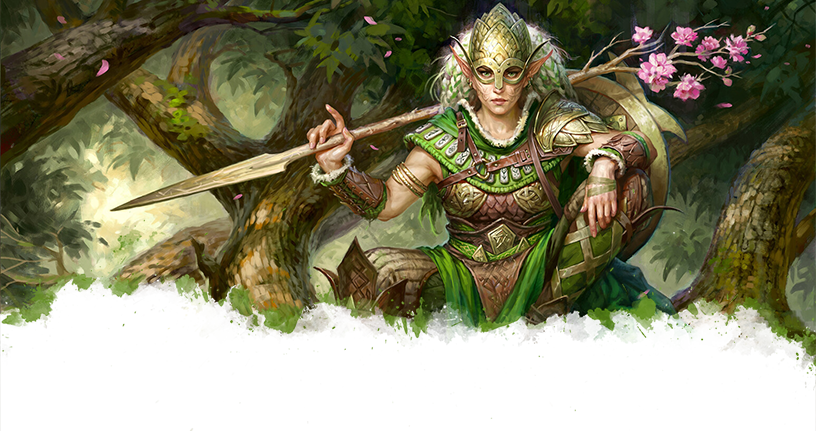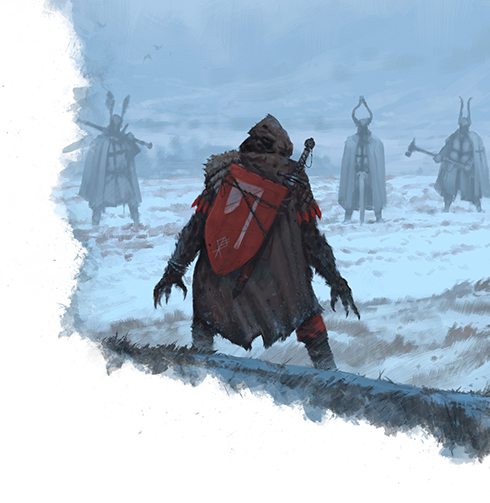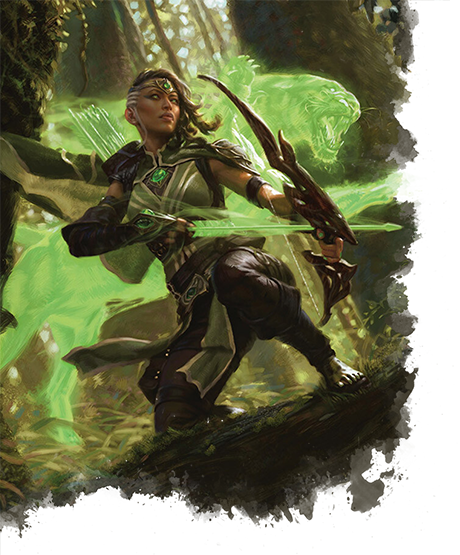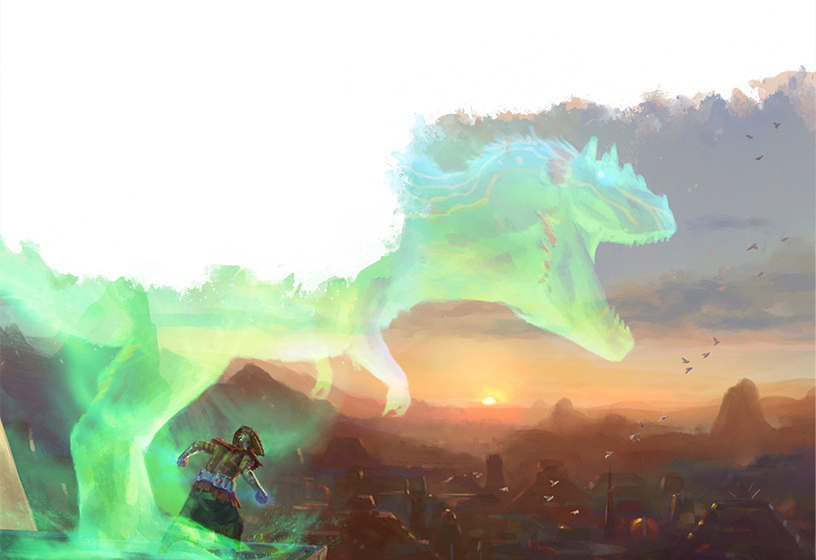
Ranger
The ranger class receives new features and subclasses in this section.
Optional Class Features
You gain class features in the Player's Handbook when you reach certain levels in your class. This section offers additional features that you can gain as a ranger.
Unlike the features in the Player's Handbook, you don't gain the features here automatically. Consulting with your DM, you decide whether to gain a feature in this section if you meet the level requirement noted in the feature's description. These features can be selected separately from one another; you can use some, all, or none of them.
If you take a feature that replaces another feature, you gain no benefit from the replaced one and don't qualify for anything in the game that requires it.
Favored Quarry
1st-level ranger feature, which replaces the Favored Enemy feature and works with the Foe Slayer feature
You know how to prepare for the day ahead, making yourself more formidable against the creatures you were expecting to face. When you finish a long rest, choose one of the following options for your favored enemy. You gain the benefit until you choose a different option:
Individual. Choose a specific individual, such as the tyrannical emperor of the local kingdom or a longstanding rival. Your attacks against that creature deal an extra 1d8 damage.
Kind. Choose a specific kind of creature, such as brown bears or young red dragons. Your attacks against those creatures deal an extra 1d6 damage.
Type. Choose a specific type of creature, such as aberrations, dragons, humanoids, or undead. Your attacks against those creatures deal an extra 1d4 damage.
Everyone. You are prepared for any and all opponents. You gain a +1 bonus to damage rolls on your attacks.
Starting at 6th level, you can choose a new option when you finish a short rest. Starting at 14th level, you can choose a new option when you roll initiative.
Additional Ranger Spells
2nd-level ranger feature
The spells in the following list expand the ranger spell list in the Player's Handbook. The list is organized by spell level, not character level. Spells with asterisks can be found in my Portfolio Guide.
1st Level
2nd Level
3rd Level
4th Level
5th Level
Prepared Spellcasting
2nd-level ranger feature, which modifies the Spellcasting feature
Instead of knowing a number of ranger spells of 1st level or higher, you prepare the list of ranger spells that are available for you to cast each day, choosing from the ranger spell list. When you do so, choose a number of ranger spells equal to your Wisdom modifier + half your ranger level, rounded down (minimum of one spell). The spells must be of a level for which you have spell slots.
You can change your list of prepared spells when you finish a long rest. Preparing a new list of ranger spells requires time spent in prayer and meditation: at least 1 minute per spell level for each spell on your list.
If you would learn a ranger spell of 1st level or higher through a class feature, you instead always have that spell prepared and it does not count against the number of spells you can prepare each day.

Fighting Style Options
2nd-level ranger feature
When you choose a fighting style, the following styles are added to your list of options.
Frontline Fighting
If you are closer to a creature than any of your allies, you gain a +1 bonus to attack rolls against the creature, and you gain a +1 bonus to AC against attacks made by the creature.
Natural Weapon Fighting
You gain a +1 bonus to attack rolls with natural weapons and unarmed strikes. When you roll damage for an attack with a natural weapon or unarmed strike and roll the highest number on a weapon or unarmed strike damage die, you can roll an additional die of the same type and add it to the total. The additional damage die may also trigger this effect.
Opportunist
When a creature you can see is hit with an attack made by a creature other than you, you can use your reaction to make a weapon attack against the target. If the attack hits, you do not add your ability modifier to the damage of the attack, unless that modifier is negative.
Skirmishing
When you hit a creature with an attack roll, you can move it 5 feet to an unoccupied space. A creature can be moved this way only once per turn.
Spiritual Armor
While you are not wearing any armor, your armor class equals 10 + your Dexterity modifier + your spellcasting ability modifier. You can use a shield and still gain this benefit.
Enhanced Two-Weapon Fighting
5th-level ranger feature
When you engage in two-weapon fighting and take the Attack action on your turn, you can make the bonus attack as part of your action instead of as a bonus action.
Wild Tactics
8th-level ranger feature
When you take the Attack action on your turn, you can forgo making one of those attacks and take the Breathe, Dash, Disengage, Dodge, Hide, Interpose*, Search, Thwart*, or Use an Object action as part of that Attack action.
Additional Fighting Style
9th-level ranger feature
You can choose one additional option from the Fighting Style class feature.
Preternatural Perception
18th-level ranger feature, which replaces the Feral Senses feature
As long as you can hear or smell, you can detect and pinpoint the locations of any creatures or objects within 30 feet of you that produce any sounds or have an odor, allowing you to effectively see creatures with your other senses even if you are blinded or in darkness. A creature cannot be hidden from you within this radius, unless magic or some other mechanism prevents its odor or sounds from reaching you.
Lethal Precision
20th-level ranger feature, which replaces the Foe Slayer feature
You gain a bonus to attack rolls equal to your Wisdom modifier.
Additionally, when you make a weapon attack against a creature and the total of the attack roll surpasses its AC by 5 or more, the attack deals extra damage equal to one roll of the weapon's damage die.
Ranger Content v 2.0 for D&D 5e
Created by: u/NotTheDreadPirate Art Credits: Ekaterina Burmak - Canopy Tactician Alayna Lemmer-Danner - Magic: The Gathering Forest Jakub Rozalski- Bait Yongjae Choi - Vivien, Arkbow Ranger Randy Vargas - Primal Might *Features marked with an asterisk make use of mechanics described in my Optional Rules document.

Moonstrider
No state of being is permanent. Like the moon, people go through their own phases, but always remain who they are.
Whether they walk on two legs or four, Moonstrider rangers are always rangers at heart. Used properly, the curse of lycanthropy can be a great blessing for those sworn to protect the wild corners of the world. They call upon the bestial power within, transforming their bodies in order to track down and eliminate their foes.
Phased Form
3rd-level Moonstrider feature
You bear and embrace the curse of lycanthropy, which grants you the power of a monstrous transformation. You choose the type of animal your lycanthropy is derived from when you select this subclass, as shown in the Curse Variety table. As a bonus action, you can enter your phased form, the appearance of which depends on your type of curse. This form lasts for 1 hour. It ends early if you are knocked unconscious or you end it as a bonus action. In your phased form, you gain the following benefits, as well as an additional benefit as shown in the Phased Form section of the Curse Variety table:
- When you hit a creature with a weapon attack, the target takes an extra 1d4 damage of the weapon's damage type.
- Your hands transform into claws, which you can use as natural weapons if they are empty. They count as simple melee weapons with the light and finesse properties. They deal 1d6 slashing damage on a hit. You can use your claws to engage in two-weapon fighting.
Curse Variety
| Phased Form | Animal Form |
|---|---|
| Ursine. You gain a +1 bonus to AC. | Brown Bear |
| Porcine. You gain a bonus to Constitution checks and saving throws equal to your Wisdom modifier. | Boar |
| Murine. You have advantage on Dexterity checks and saving throws. | Rat |
| Tigrine. The damage of your claws increases to 1d8. | Tiger |
| Lupine. Once on each of your turns, you can choose to give yourself advantage on an attack roll if at least one of your allies is within 5 feet of the target and the ally isn't incapacitated. | Wolf |
Once you use this feature, you can’t do so again until you finish a short or long rest, unless you expend a spell slot of 1st level or higher to use it again.
Feral Senses
3rd-level Moonstrider feature
No prey escapes your notice. You have advantage on Wisdom (Perception), Wisdom (Survival), and Intelligence (Investigation) checks that involve hearing or smell.
In addition, you gain darkvision out to a range of 60 feet. If you already have darkvision, its range increases by 30 feet.
Animal Form
7th-level Moonstrider feature
With mastery of your curse comes more extreme transformations. As an action, you can expend a use of your Phased Form feature to cast polymorph on yourself, without expending a spell slot or material components. When you cast this spell this way, you retain your Intelligence, Wisdom, and Charisma scores, and you can only turn yourself into the beast that corresponds to your type of lycanthropy, as shown in the Animal Form column of the Curse Variety table.
Lunar Blessing
7th-level Moonstrider feature
You draw a shawl of moonlight around yourself, armored by the gloom. While in your Phased Form, any bludgeoning, piercing, or slashing damage that you take is reduced by an amount equal to your Wisdom modifier, unless the damage was dealt by a silvered weapon.
Additionally, your walking speed increases by 10 feet in your Phased Form.
Moon Warrior
11th-level Moonstrider feature
Fury fuels itself, until there is nothing more to feed upon. Once per turn when you score a critical hit or reduce a creature to 0 hit points, you can immediately move up to half your speed and make one weapon attack.
Predator's Howl
15th-level Moonstrider feature
As a bonus action you can let loose a roar or call of primal power, terrifying any unfortunate enough to hear it. Hostile creatures within 60 feet that can hear you must succeed on a Wisdom saving throw against your spell save DC. On a failure, the creature is frightened of you for 1 minute. While frightened in this way, a creature suffers a -3 penalty to AC and Dexterity saving throws. A target can repeat the saving throw at the end of each of its turns, ending the effect on itself on a successful save. Once you use this feature, you can’t do so again until you finish a short or long rest.

Spiritcaller
The natural world is not a passive system. Each bird, beast, rock, tree, and drop of water is indelibly connected, a manifestation of a larger force. Spiritcallers see these connections in a way few others can, creating lasting bonds with the spirits that inhabit the wild places of the world. These rangers channel the will of nature, empowering themselves with the best traits of the varied spirits, and calling mighty manifestations of life itself to fight by their sides.
Wild Weapon
3rd-level Spiritcaller feature
You can imbue a weapon with the ability to channel the spirits of nature, physically altering it. The weapon might become illuminated by a localized aurora, sprout moss or vines, or change in appearance to resemble stone, horn, bone, or crystal.
When you finish a long rest, you can create your wild weapon by touching a simple or martial weapon and infusing it with nature's power. You can use Wisdom, instead of Strength or Dexterity, for the attack and damage rolls when you attack with your wild weapon, and attacks with your wild weapon deal an extra 1d4 force damage on a hit. This weapon counts as magical for the purpose of overcoming resistance and immunity to nonmagical attacks and damage. The weapon retains this magic until you finish a long rest.
Spirit Bonds
3rd-level Spiritcaller feature
Ever present, never seen, the spirits of nature heed your call. You learn two spirit bonds of your choice, which are detailed in "Spirit Bonds" below. Each bond represents a spirit of nature that you have forged a connection with.
If a spirit bond forces a creature to make a saving throw, the DC is equal to your spell save DC.
You learn one additional spirit bond at 6th, 11th, and 15th level. When you gain a level in this class, you can replace one spirit bond you know with a different one.
Primal Awakening
6th-level Spiritcaller feature
The forces of nature are stirred by your call, appearing at your side in times of need. As a bonus action, you can learn an additional spirit bond of your choice, which you retain for a number of hours equal to your Wisdom modifier, or until you dismiss it as a bonus action.
The number of times you can use this feature is based on the level you've reached in this class: 6th level, once; 11th level, twice; and 15th level, thrice. You regain all expended uses when you finish a long rest.
Phantasmal Guardian
11th-level Spiritcaller feature
To see the patience of nature turn to wrath is to see one's life cut short. As an action, you can call forth the spirit of a beast of your choice. The beast must be of a CR equal to or lower than the number of spirit bonds you know. The spirit appears in an unoccupied space of your choice within 30 feet of you, and is a ghostly and translucent version of the beast. The spirit shares the statistics of the beast you chose, but it has resistance to all damage and can move through creatures and objects as if they were difficult terrain. The spirit's attacks are considered magical for the purposes of overcoming resistance and immunity to nonmagical attacks and damage.
The spirit is an ally to you and your companions. In combat, the spirit shares your initiative count, but it takes its turn immediately after yours. It obeys your verbal commands (no action required by you). If you don’t issue any, it takes the Dodge action and uses its move to avoid danger.
The spirit remains for 1 hour, until it falls to 0 hit points, or until you lose your concentration (as if you were concentrating on a spell). Once you summon the spirit, you cannot do so again until you finish a short or long rest.
Symbiotic Manifestation
15th-level Spiritcaller feature
Nature itself is alive, an interconnected system in self-sustaining harmony. When you use your Phantasmal Guardian feature, the spirit shares all the spirit bonds you know. If the spirit forces a creature to make a saving throw, it uses your spell save DC. All of its weapon attacks are considered to be its wild weapon, causing its attacks to deal an extra 2d4 force damage on a hit.
Additionally, whenever you finish a long rest, you can replace one spirit bond you know with a different one.
Spirit Bonds
The spirit bonds are presented in alphabetical order.
Bat. While you can hear, you have blind sight, and the range is a number of feet equal to five times the number of spirit bonds you know. If you already have blind sight, its range increases by the same amount. Within that range, you can effectively see anything that isn't behind total cover, even if you're blinded or in darkness. Moreover, you can see an invisible creature within that range, unless the creature successfully hides from you.
Bear. Your carrying capacity, and the weight you can push, drag, or lift, are doubled. You count as one size larger for the purposes of grappling, shoving, and throwing, and your height is increased by a number of inches equal to the number of spirit bonds you know.
Boar. The damage die of the extra force damage dealt by your wild weapon increases to a d6 if the attack is a melee attack. This damage die increases to a d8 if you move at least 20 feet in a straight line immediately before making the attack roll.
Cloud. When you take the Attack action on your turn while wielding your wild weapon, you can forgo making one of your attacks to teleport up to 30 feet to an unoccupied space you can see. You can use this ability a number of times equal to the number of spirit bonds you know, and you regain all expended uses when you finish a long rest.
Crocodile. You have advantage on attacks with your wild weapon against creatures that are grappled by you. When a creature attempts to escape being grappled by you, you can make one attack against the creature with your wild weapon as a reaction before the contested check is made.
Eagle. You gain a bonus to Wisdom (Perception), Wisdom (Survival), and Intelligence (Investigation) checks that involve sight. The bonus equals the number of spirit bonds you know.
Fire. When you hit an attack with your wild weapon, you can cause the extra force damage to become fire damage instead. Once on each of your turns when you deal fire damage to a creature this way, you can force the creature to make a Dexterity saving throw. On a failure, you cause the creature to become wreathed in flame, and the next time a creature makes an attack against the target before the start of your next turn, they gain a bonus to the attack roll equal to the number of spirit bonds you know.
Fish. Your swimming speed is increased by a number of feet equal to five times the number of spirit bonds you know. In addition, you can breathe underwater.
Flower. When you hit an attack with your wild weapon, you can cause the extra force damage to become radiant damage instead. Once per turn you deal radiant damage to a creature this way, you can force the creature to make a Wisdom saving throw or become charmed by you until the end of your next turn.
Fog. You gain a bonus to Dexterity (Stealth) checks equal to the number of spirit bonds you know, and you can attempt to hide while you are only lightly obscured.
Fox. You gain a bonus to initiative rolls equal to the number of spirit bonds you know.
Frog. Your jump distance is tripled, and you can use Wisdom, instead of Strength, to determine how far you can jump.
Frost. When you hit an attack with your wild weapon, you can cause the extra force damage to become cold damage instead. When you deal cold damage to a creature this way, you can reduce its speed by 10 feet until the start of your next turn. A creature's speed can only be reduced this way once per turn.
Grass. You can speak with Plant creatures and vegitation as if you shared a language. You gain a bonus to ability checks made to interact with them equal to the number of spirit bonds you know.
Hawk. The damage die of the extra force damage dealt by your wild weapon increases to a d6 if the attack is a ranged attack. This damage die increases to a d8 if you make the attack with a ranged weapon at long range.
Lake. You have a number of d10s equal to the number of spirit bonds you know. As a bonus action, you can touch a creature and expend one or more of the dice. Roll the dice you expended, add them together, and restore a number of hit points to the creature equal to the total. You regain all expended dice when you finish a long rest.
Lightning. When you hit an attack with your wild weapon, you can cause the extra force damage to become lightning damage instead. Once per turn when you deal lightning damage to a creature this way, you can cause a different creature within 10 feet of the target to take lightning damage equal to the number of spirit bonds you know.
Lion. When a hostile creature you can see ends its turn within 5 feet of one of your allies, you can use your reaction to move up to half your speed towards the creature and make one attack against it with your wild weapon. You can use this ability a number of times equal to the number of spirit bonds you know, and you regain all expended uses when you finish a long rest.
Lizard. Each hour while you are missing half or more of your hit points, you regain a number of hit points equal to the number of spirit bonds you know. You don't gain this benefit if you have 0 hit points. You can regrow any missing body parts such as severed limbs over the course of 24 hours.
Mountain. You gain a bonus to any Constitution saving throw you make to maintain your concentration on a spell. The bonus equals the number of spirit bonds you know.
Owl. When you fail an ability check or miss an attack roll with your wild weapon, you can choose to grant yourself a bonus to the roll equal to the number of spirit bonds you know, potentially causing it to succeed. Once you use this ability, you cannot use it again until you finish a short or long rest.
Rabbit. As a bonus action, you can take the Dash and Disengage actions simultaneously. You can use this ability a number of times equal to the number of spirit bonds you know, and you regain all expended uses when you finish a long rest.
Rain. Once per turn when you score a critical hit with your wild weapon, you can immediately make one attack with your wild weapon. If this attack hits, it deals extra damage equal to the number of spirit bonds you know.
Raven. You can speak with Beasts as if you shared a language. You gain a bonus to ability checks made to interact with them equal to the number of spirit bonds you know.
Rhino. You deal double damage to objects and structures. When you hit a creature with an attack with your wild weapon, you can push the creature away from you, by a number of feet equal to five times the number of spirit bonds you know. Once you use this ability, you can't use it again until you finish a short or long rest.
River. When you hit a creature with your wild weapon, you can force it to make a Strength saving throw or be knocked prone. A creature cannot be forced to make this saving throw more than once per turn.
Robin. As a bonus action, you can grant yourself a flying speed for 10 minutes. This flying speed is a number of feet equal to equal to five times the number of spirit bonds you know. Once you take this bonus action, you can't do so again until you finish a short or long rest.
Snake. You have resistance to poison damage. You gain a bonus to saving throws you make to avoid or end the blinded, deafened, paralyzed, or poisoned conditions on yourself. This bonus equals the number of spirit bonds you know.
Spider. When you hit an attack with your wild weapon, you can cause the extra force damage to become necrotic damage instead. Once per turn you deal necrotic damage to a creature this way, you can force the creature to make a Wisdom saving throw or become frightened of you until the end of your next turn.
Squirrel. Your climbing speed increases by 10 feet, and you have advantage on ability checks made to climb difficult surfaces. In addition, any falling damage you take is reduced by an amount equal to five times the number of spirit bonds you know.
Stag. Your walking speed increases by 10 feet. As a bonus action, you can grant yourself the ability to ignore any effect that would reduce your speed or cause you to expend extra movement until the end of your turn. You can use this ability a number of times equal to the number of spirit bonds you know, and you regain all expended uses when you finish a long rest.
Stone. Bludgeoning, piercing, and slashing damage that you take is reduced by an amount equal to the number of spirit bonds you know.
Swan. You can create two wild weapons whenever you finish a long rest. When you use your action to cast a spell of 1st level or higher, you can make one attack with one of your wild weapons as a bonus action.
Tiger. Attacks with your wild weapon score a critical hit on a roll of 19 or 20 on the d20. Your wild weapon scores a critical hit on a roll of 18-20 if the target hasn't taken a turn yet in the current combat.
Tree. At the end of each of your turns, you gain temporary hit points equal to the number of spirit bonds you know, provided you have not moved from the space where you began your turn.
Turtle. When you roll initiative, you can choose to take a -5 penalty to the roll. If you do so, you gain a +1 bonus to your AC for the next 10 minutes or until you roll initiative again.
Vulture. As a reaction when a creature is reduced to 0 hit points within 10 feet of you, you can regain a number of hit points equal to your proficiency bonus + the number of spirit bonds you know, provided you had fewer than half your maximum hit points when the creature died.
Wildcat. When you hit a creature with an attack with your wild weapon, you can choose to reroll all the attack's damage dice and use either total. You can use this ability a number of times equal to the number of spirit bonds you know, and you regain all expended uses when you finish a long rest.
Wind. Once per turn when you make an attack with your wild weapon, you can move up to 10 feet immediately before or after making the attack. This movement does not provoke opportunity attacks. You can use this feature a number of times equal to the number of spirit bonds you know, and you regain all expended uses when you finish a long rest.
Wolf. As a bonus action, you can grant yourself and a creature you choose within 30 feet of you advantage on attack rolls until the start of your next turn. To gain this benefit, the target of the attack roll must be within 5 feet of one of the attacker's allies and the ally can't be incapacitated. You can use this bonus action a number of times equal to the number of spirit bonds you know, and you regain all expended uses when you finish a long rest.
Wolverine. When you create your wild weapon, you can choose your unarmed strikes or one of your natural weapons instead of a simple or martial weapon. While you are missing half or more of your hit points, you gain a bonus to damage rolls made with your wild weapon equal to the number of spirit bonds you know.
